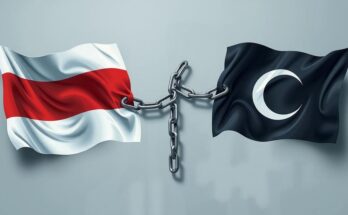Kuwait has released several American prisoners, including veterans and military contractors, after years of imprisonment for drug offenses. This action follows a diplomatic visit by U.S. officials and aligns with efforts to bring home American citizens detained abroad. The families of those released express gratitude and hope for future releases.
Recently, Kuwait has released several American inmates, which include veterans and military contractors, who had been imprisoned for extended periods due to drug-related offenses. This release is interpreted as a gesture of goodwill between Kuwait and the United States, according to a representative for the detainees speaking to the Associated Press.
The release, affecting at least six U.S. nationals, follows a visit to the region by Adam Boehler, the top hostage envoy from the Trump administration. This effort aligns with ongoing U.S. initiatives to secure the return of American citizens detained overseas.
Jonathan Franks, a consultant who aids in cases involving American hostages, accompanied six of the released individuals on a flight from Kuwait to New York. He expressed gratitude towards the Kuwaiti government for their humanitarian gesture, noting that his clients upheld their innocence. Franks expects further releases of Americans by Kuwait in the future.
The names of the detainees freed have not been publicly shared, and the State Department did not provide immediate comments on the matter. Furthermore, Kuwait has not confirmed the release via state media and has remained silent in response to inquiries from the Associated Press.
The release of American prisoners by Kuwait signifies a potential thaw in relations between the two nations and highlights the ongoing U.S. efforts to support its citizens abroad. Despite the complexities surrounding detainees in Kuwait, this delicate diplomatic interaction illustrates the importance of advocating for the welfare of imprisoned nationals. As Kuwait navigates its international relations, the hope remains for a continuation of such humanitarian gestures.
Original Source: www.cbsnews.com




